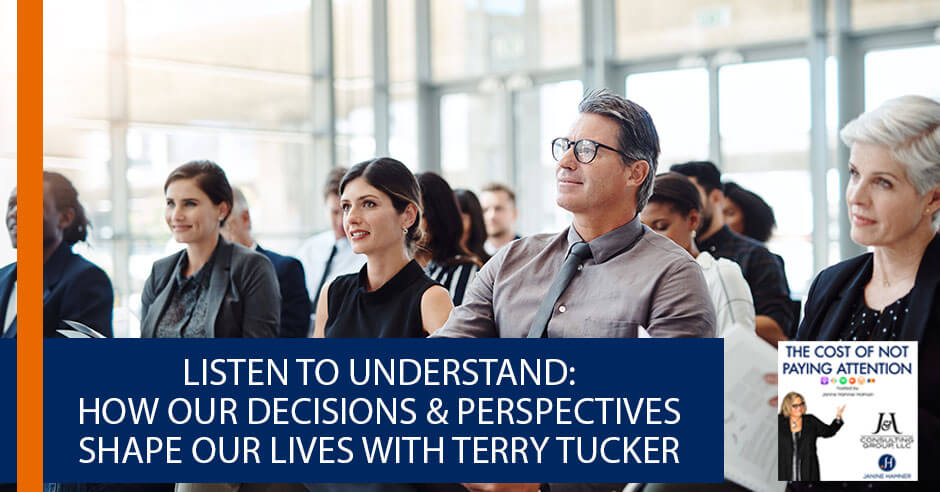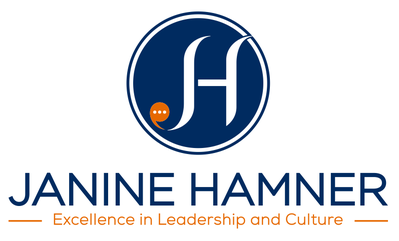
Listening to understand instead of listening to respond. We were all born unique, and with that comes the challenges of dealing with our differences. With our diverse culture, upbringing, beliefs, and point of views, not to mention the stressors that we have to face individually, it can easier to detach and isolate ourselves instead of reaching out and making a connection with the world. In this episode, an International podcast guest on the topics of motivation, self-development, and mental health, Terry Tucker, talks about how important that human connection is and how it impacts our mental health, jobs, and the people we value the most. Tune in to get insights on how you can effectively listen and build connection instead of paying the cost of not paying attention.
GUEST: Terry Tucker | LinkedIn, Facebook, Twitter, and Instagram | Visit their Website: Motivational Check
HOST: Janine Hamner Holman | [email protected] | LinkedIn, Facebook, Instagram, and Twitter |
—
Listen to the podcast here
Listen To Understand: How Our Decisions & Perspectives Shape Our Lives With Terry Tucker
What am I paying attention to? Illness and the power of our perspectives. I don’t want to go down a dreary hole but I have a friend who is in the final stages of being a cancer warrior. Unfortunately, she is losing her battle.
I have another friend, Bill Valentine, who has spent his career as an architect. He was the head of HOK, the largest architectural firm in the world. Bill is the most down-to-earth, humble, happy, and glass-half-full kind of human. He has also been suffering from acute leukemia for several years such that, statistically, he should not be here, and yet he is. He is living his best life even though, like in everybody else’s life, there have been challenges. There have been other health issues, kids, grandkids, a spouse, and things happening. Through it all, his perspective is that life is great. He says, “I am great. Everything is going well,” which can make such a difference in all of the circumstances into which we are thrown.
We all deal with circumstances in our own way. Our perspective, outlook, and lens through which we look make an enormous difference in our resilience and how we manage through those things. Our guest for this episode, Terry Tucker, is an international podcast guest on the topics of motivation, self-development, and mental health.
Terry has enjoyed an extraordinary life. He has been a college basketball player, a marketing executive, a hospital administrator, a SWAT team hostage negotiator, and a cancer warrior. Terry is the Founder of Motivational Check LLC and the author of the book, Sustainable Excellence: Ten Principles To Leading Your Uncommon And Extraordinary Life. Welcome, Terry.
Thanks, Janine. I’m looking forward to our conversation.
I am so looking forward to it as well. Thank you for being here with us.
I’m going to start the way that I often do: what is something that you have become aware of that people are not paying attention to, either intentionally or unintentionally, and what’s the cost of that inattention?
We would do much better as a society if we start listening to understand instead of listening to respond. Share on XWhen we were talking before the show, I thought, “Where am I going to go with that?” Where I would like to go with it is to share what I learned when I worked as a SWAT team hostage negotiator. What I learned, and what I think many people need to get a better understanding of, is the importance of listening. I’m talking about the difference between listening to understand versus listening to respond.
I see a lot of people who relate to others like “Hurry up and say what you are going to say because I want to get my two cents in,” versus, “I hear what you are saying. I may agree with you. I may not agree with you. Help me understand where you are coming from.” If we would do the latter more often, we would take a turn for the better as a society.
Oftentimes, people do not hear what others are saying, let alone understand where they are coming from. We are at a point in our society where we are not doing a good job of listening to understand. Most people can probably figure out the downside of that: we don’t know what’s going on. We don’t realize what others are saying because we are speaking, or preparing to speak, too.
I can relate. My default listening is “What do I think about what he is saying? Do I agree with it?” Often, we are listening for agreement. As humans, we need connection. We need to feel like we belong. We either have a connection or we do not agree so we don’t have a connection. It is either, “How am I going to rebut what you said or how am I going to get you to see things the way that I see them?” If I think, “If Terry is wrong about that and I disagree, how am I going to rebut what he said or get him onto my team?” I am no longer listening to you. I am formulating a strategy in my head.
A few years ago, I was on a team from Harvard Business Review. One of the things that we were discussing is that all human beings think that we can multitask. We think we can listen and think at the same time. We think we can listen and type at the same time. We think that we can watch TV, be on our phones, and be paying attention to both things at the same time. The human brain is incapable of doing that. All you are doing is switching back and forth really fast between the TV and phone. The more that we do that, the stupider we get. Our IQ points start going down.
When I think I’m listening to you or to the brilliance that you have to share but what I’m doing instead is formulating my counter-arguments, there are really two things happening: I’m not understanding anything about you, your perspective, or what brilliance you want to share with me, and I’m not learning anything. What we need to do is slow down, pay attention to each other, listen to learn, listen to understand, and listen to what’s important to you as you are sharing with me instead of thinking about, “Do I agree or disagree?” Maybe I can think, “What’s likely to be important to him?” I will keep listening through that filter because then, you and I are going to have an authentic conversation and connection.
You talked about thinking, “Terry is wrong.” What do we do in that case? What do a lot of people do? They judge because it’s easier to judge than it is to think. Somebody said that. It wasn’t me, but I love it. I think, “You are not on my team, there must be something wrong with you.” That’s the other problem, especially in politics. If our ideologies don’t line up, then you must be bad. Why do you have to be bad? Why can’t we disagree on a topic? It’s the old Christian thing of, “Hate the sin but love the sinner.” Why do you have to be bad because we don’t agree on something? I’ve never understood that, and it drives me nuts when I hear that.
When you think about listening and the opportunity that we all have every day to get better at listening, how does that connect to what you are up to in the world? You are up to some big stuff.

Listen To Understand: As negotiators, we were not face-to-face with the person with whom we were negotiating so we had to figure things out based on what people were saying, what they weren’t saying, and how they were saying it.
That was one thing that I learned as a negotiator. Ninety-nine percent of what we did as police officers was being face-to-face with other human beings. I’m pulling you over to give you a ticket, I’m answering a radio run for a domestic or a fight, or I’m knocking on your door to say, “Call the hospital. Grandma died and they can’t get a hold of you.” That’s face-to-face.
As negotiators, we were not face-to-face with the person with whom we were negotiating. We had to figure things out based on what people were saying, what they weren’t saying, and how they were saying it. I’ve come to a point in my life now where I’m not just tuned into what people say but to how they act.
What drives me nuts is people who say one thing and then do something else. I don’t put a lot of stock in what people say. I put a whole lot more stock in what people do. Show me that your actions match your words. For a couple of years, I have been dealing with this rare form of cancer and have had to deal with doctors, nurses, therapists, and all kinds of people.
Some of them are very direct, “Here it is,” and I don’t have to figure out what’s going on. Others are on the fringes. I think, “What are you trying to tell me? Am I in trouble? Am I not in trouble? Is this good? Is this bad? What’s the deal?” Listening when I was a negotiator has helped me be more involved in my cancer journey. I want my life to be shaped by the decisions I made, not by the decisions that I didn’t make or that somebody else made for me.
I want to pick up on that and then I want to go back to something else that you said. Dan Pink has a new book called The Power of Regret. He invited people to email or send him information about their biggest regrets in life. Overwhelmingly, the single biggest thing that people regret is not going for something like not asking that girl to the dance, not swinging out and trying for that job or not swinging out at opening their own business.
I love what you said, that you want to make the decisions that are impacting and affecting your life. You are actually talking about your life, not just the experience of your life. In fact, you talk about your existence here on the planet being shaped by decisions that you are actively making. I believe it was John Lennon who said, “Life is what happens while you are making other plans.” Not making a decision is also a decision. The more active we can get in our lives and our own experiences, the richer our experiences are.
I always tell young people, especially, that if there’s something in your heart or soul that you believe you are supposed to do but it scares you, go ahead and do it. At the end of your life, the things you are going to regret are not going to be the things you did. They are going to be the things you didn’t do it. By then, it’s going to be too late to go back and do them.
I’m starting a new initiative around inclusion and belonging and I was talking with my parents about it. My dad was a very successful businessman. My mom was an instructor and teacher at the collegiate level. These are both smart, accomplished people and they were both like, “That’s big.” It’s big and it’s scary. It scares the heck out of me, which is how I know it’s what I am being called to do. It is what my heart is being called to do. I will be talking more about that in a future episode once it gets a little more formed.
I want my life to be shaped by the decisions I made, not the decisions I didn't make or that somebody else made for me. Share on XI want to go back. For years, you are dealing with this issue around wellness. In our first conversation, one of the things that you and I talked about is the fact that there’s an interesting correlation happening in our personal health and the health of our organizations. It was in 2021 that the World Health Organization designated burnout as a problem happening in organizations and that organizations were not effectively figuring out how to help people manage stress as opposed to it being a personal phenomenon.
Like, “I am burnt out.” No. Your organization is burning you out. That shift is interesting. I’m curious from the work that you are doing and the folks with whom you are having opportunities to speak, how do you see wellness or health writ large playing out both on the personal level and on the level of organizations?
If I go back to when I was a policeman, I was in Cincinnati. We had access to a psychologist but there was an unwritten rule that you don’t want to go see a psychologist. We don’t do that stuff. We see man’s inhumanity to man, death, ugliness, helplessness, and hopelessness but you can’t let that affect you. If you look at the divorce rate for police officers and alcohol and drug rate, all of those are much higher than the normal population.
I was doing a show earlier and somebody asked me about that. It’s like, “How did you deal with that?” I said, “I certainly had the opportunity to go out after a shift, to go to the bar and have a drink but I never did that because I knew what grounded me.” We all need something that grounds us. We all need something that we know is the bedrock of our souls. For me, that was my family. I was like, “I don’t want to go out to the bar. I love you guys. You are great. I will do anything in the world for you but I’m going home to my family because that’s what grounds me.”
When I’m not at home, I spend most of my time at the hospital getting treatment. I work with an incredibly great group of nurses. I don’t know if you’ve ever had the opportunity to read the book Legacy by James Kerr. It’s about the New Zealand national rugby team, which by all accounts is the most successful sports franchise in any country of all time.
I don’t know anything about rugby so I’m not going to sit here and tell you I do. They are called the All Blacks because their uniforms are all black. When the All Blacks are bringing on a new player, you would think, “They are bringing on somebody for technical competency. I’m good at rugby or whatever position for rugby.” They do, to a point, but they focus on two things: character and humility. What kind of person are you? When you lose, do you kick the dog? Do you go home and hit your wife? Are you that kind of a person or can you handle defeat without being a loser?
I think back to my day when I had a number of job interviews. You always go into these interviews. You are like, “I better have all the answers to all the questions. Otherwise, I’m probably never going to get this job.” What the All Blacks say is, “We don’t expect you to have all the answers individually but collectively, as a team, we will figure out the answers.” I read that book and I was sitting with all the nurses. I was like, “These are people of good character. These are kind, caring people. They are also incredibly humble.” They were like, “We are just doing our job.” I was like, “You guys are great.”
It’s interesting how it dovetails into something that is going on in New Zealand. I don’t know if they consciously hire nurses in my unit for that but it certainly seems they are the kind of people who are caring, loving, and giving. They are also humble. I don’t like going for treatment but I will tell you, they make it a whole lot better.

Listen To Understand: If there’s something in your heart, something in your soul, something you believe you’re supposed to do, but it scares you, go ahead and do it. At the end of your life, the things you’re going to regret will not be the things you did but the things you didn’t do.
A big shout out to nurses! My husband had hip replacement surgery, and then he had a minor operation on his hand to deal with carpal tunnel and the fact that he had no feeling in his hand. We have had the opportunity to be around some wonderful and caring nurses. Yay for surgeons and all of those people too but it’s the nursing care. It’s the people that you are dealing with day in and day out who are there for you.
You know the saying that someone will hold your hair when you were throwing up? They are the ones that have your back, rub your back, and are there for you. One of the things that is interesting about that, and the story about the All Blacks New Zealand team, is this idea of hiring for personality and what used to be called soft skills. I call it superpowers. It’s that whole category of our ability to connect with other people and understand what’s happening within ourselves. It’s having emotional intelligence. It’s then being able to make good decisions. It’s creating a psychologically safe work environment.
I can’t remember which football team it is but there was a football team that was on a big losing streak. They had lost for a number of consecutive years. They brought in their new head coach who understood football and had incredibly high emotional intelligence. He connected with his players as humans and not as players, producers, goal scorers or stoppers. He connected with them as people. Their interest in winning for their coach skyrocketed. They went on to win a Super Bowl very quickly after hiring this coach who turned around the organizational culture of the team.
I think about different professions, companies, and organizations that are making those decisions. I’m going to fly up to the Bay Area on Southwest. You know when you are on Southwest Airlines because you feel the personalities of the flight attendants. It’s part of their culture that if you are gay, straight, Black, Latino or whoever you are, you bring your whole self to work. These folks in general are super happy. They are super engaged and happy to be there. They are happy to greet you. It’s a very different experience than flying on most other airline carriers.
Southwest has made a big investment in emotional intelligence, in training their people, and in hiring a certain type of person. They want folks who are bubbly and energetic. They can get down the nuts and bolts of what you need to know about managing the plane and managing the plane in an emergency but they are hiring for disposition. They are hiring for soft skills as opposed to technical know-how. There’s a major sea change that’s happening in that direction.
I think you need that. I think back to my time as a high school basketball coach. It’s not a one-size-fits-all. It’s not like, “Here are the rules.” When somebody would make a mistake, you had to know, “I need to get in that person’s face and yell and scream at him versus the player that you need to look at because they are going to be ten times harder on themselves than I ever will versus the player in the middle. That’s the nuance of coaching.
It’s not just throwing the ball out there and saying, “I’m going to teach you some Xs and Os and we are going to go out and win the Super Bowl.” No. It’s, “Do you understand how I operate? Do you understand how to motivate me and keep me engaged?” It’s not a, “You are a football player, so all I have to do is this and it works for everybody.” It doesn’t. The same thing is true in business. You have people who say, “I made a mistake,” and you tell them, “You better never make that mistake again.” There are also people who say, “I screwed up. It will never happen again.” You know it won’t ever happen again because they will be ten times harder on themselves than you are going to be on them.
You have those other folks, which is one of the things that is so interesting when thinking about the last couple of years. Before we started recording, one of the things that you and I were talking about is the opportunity to find whether it’s a golden nugget, a lesson, or a silver lining. We need to find something that is an opportunity, or a positive outcome, in the midst of challenges.
When we give of ourselves selflessly, when we are happy to serve, when we have that idea of servant leadership, that is when the good stuff happens for us and the world. Share on XWe have certainly been going through a challenging couple of years. When I think about the shift that is happening with employers understanding you are a whole new person, it may be that you are having a hard time. The rates of depression and anxiety have skyrocketed since we have been dealing with COVID. Forty-one percent of people are dealing with clinical depression. Seventy-six percent of people are dealing with clinical anxiety. That is more than 1 in 3. It is 3 out of 4. You are realizing that you screwed up but you don’t normally screw up anything. You are normally on top of it.
Maybe rather than getting in your face or giving you that look, instead, I’m going to say, “Is something going on?” I’m going to open up the possibility of a real conversation where you can then share with me, “I have this person who’s sick. I’m dealing with a health issue. My mother-in-law has come for a stay. The kids are having a hard time or I’ve got a good friend whose daughter is dealing with a mental health issue.” People are going through stuff, and people have always been going through stuff but the pace of stuff that we are going through seems accelerated. The number of people dealing with stuff has escalated.
Something great has happened with us being more willing. It’s not necessarily everybody. It’s also not necessarily truly willing but, in general, being a little more willing to have conversations where we open up to each other and have a conversation about mental health or physical health. If I see some mistakes that are uncharacteristic of you, I will say, “What’s going on?” Sometimes that might take me sharing something that’s happening in my life so that you know it is a safe place and you can share with me. I’m not going to take that and beat you over the head with it.
That’s making a connection. When I was a negotiator, when I would talk to groups, people would always say, “I think somebody might be getting ready to harm themselves or commit suicide but I didn’t want to say anything.” I used to tell people we would ask point-blank, “Are you thinking of killing yourself?” They would ask, “Aren’t you putting that idea into their head?” I’d respond, “No.” If they are not going to do it, they will fire back at you like, “No, you idiot. I’m not thinking of doing that.” If they are thinking of that, you open the door where you might give them that opportunity to step through and they think, “Thank God. Somebody cares. Somebody is willing to at least listen to me.”
We have this intuition when something is going on. If you think someone is going to harm themselves, ask them flat out, “Are you going to hurt yourself? Are you thinking about killing yourself?” If they are not, they are going to tell you that. If they are, you may have saved their life. By doing nothing, you take yourself off the hook. On the other hand, imagine how good you will feel if they open up to you and they don’t kill themselves because all you did was ask, “How are you doing? Are you okay? Are you thinking of hurting yourself?” You opened the flood gates and they thought, “Somebody cares about me.” You made that connection.
I want to tie that back to your experience in the police force. I have had the opportunity to get to know a lot of police officers and a number of police chiefs. There is a challenge in that culture like in a number of other cultures where the organizational culture does not support saying, “I need help,” or going and getting help after the things that cops see on a day-to-day basis.
When my husband and I were on our honeymoon in Tahiti, we met and connected with two police officers. We connected with an officer from the Baltimore PD and an officer from somewhere in the Midwest. They were sharing stories of the opioid epidemic, telling us that kids as young as eight years old were overdosing. You see the worst of humanity. You need a place where it is okay to ask for help. If that were my day-to-day existence, I would need help managing myself in the face of such tragedy, sadness, and wasted opportunities.
Not to mention, all the anger that’s being directed at cops. It’s a tricky situation. What do you do if you are somebody in one of those professions who’s reading this or if you want to be supportive of folks in those professions where the idea of getting help, going to the therapist, and doing talk therapy is a big no-no?

Listen To Understand: Love is not a word you hear a lot in locker rooms and police districts, but it’s something that is important because we need to love. We need to love what we do, ourselves, and our fellow man. It is the overarching thing that makes us the people and society that we are.
A lot of times, when I talk about this, I say to people, “Imagine if this was your job. 1) You make less money than a plumber. 2) Every time you go to work, nobody wants you there, and, 3) Everybody lies to you. How long would you do that job?” That’s a cop’s job. They make less money than a plumber. Nobody wants them there. It’s never a good thing when a cop is around. Everybody lies to you because they are trying to make their story be the one you believe so you will take the other guy to jail. Think about that. That’s the starting line.
That’s where you start, and then you build on top of that all the things that you see from the death to the things that people do. When I was in the drug unit, I’d see what people do to get drugs, and how they sell themselves or their bodies. You see it all. You have to be grounded in something, whether it’s faith, family, girlfriend, boyfriend or friend. It’s somebody that you can say, “I’m having a tough day today.”
When I was working at Cincinnati, I remember I had a guy that I used to ride with occasionally. He ended up dying one night. He was killed in the line of duty. I remember going back to the district afterward and one of the bosses asked, “How are you doing?” I told him, “I’m okay.” I was grounded. I had that family.
If something happens and you want to check-in, do that. Ask, “How are you doing? How are things going? Are you okay? Do you want to go and get something to eat after work?” Check-in with people and find out how they are. The other thing is you’ve got to have a ton of courage to say, “I’m not okay.” If you think about what we do, we carry a gun and a badge and we have the ability to take your life. I remember having three hours of sleep, I had a fight with my wife, and my boss was on my case. I thought, “You are sending me out on the street to deal with the public?” You have to have a tremendous amount of courage to be able to say, “I need help.” It’s not just a profession.
I think that it’s the same thing with the military. It’s not a profession that is to the point where we say, “You need help. We are going to get you help or I’ve identified you as somebody who needs help.” When somebody is beating up their wife, we are going to take their guns away. We are great about doing that but we are not about taking care of ourselves to the point where we are saying, “I need help. I need it now. I can’t wait.”
I don’t know what the answer is. It’s got to be agencies, chiefs, and the rank and file saying, “It’s okay. We get it. We see what you see on a daily basis. We have been through that. It’s okay to need help. When you come back to the job after you get your help, we are going to be here. We are going to support you.” It’s better now than it was many years ago when my grandfather was a policeman back in the 1920s and 1950s.
I’m not sure we are there yet. Somebody has got to do that job but we also have to support the people who do that job and understand that we are asking them to make a split-second life and death decision. Sometimes, you are going to be wrong, and that doesn’t make you a bad person. That just means you made a mistake.
What you are pointing to in terms of the strength that it takes to say, “I need help.” Unfortunately, we have it in our society that to be vulnerable is to be weak. In my experience, and in talking with law enforcement and with people in the military, the reality is the complete opposite. It takes strength to be vulnerable. It is one of the strongest things someone can do.
Regardless of what you do, you were put here to serve—whether you believe in God, to serve your God but to certainly serve each other. Share on XBrené Brown talks about vulnerability a lot. I am paraphrasing but she says, “The thing that I most want to see in you and the thing that is most going to connect me to you is the thing that I least want to show you, which is my vulnerability.” When we get vulnerable with other people, that is when we get connected. That is when we start to feel like, “You are my people even if you different beliefs than I have. You might have a different lived experience. You might have a different world perspective than I do.”
When we can get vulnerable with each other and tell each other what it’s like being over here in this body and walking through the world, it goes right back to that listening to learn and listening to understand. When we can share honestly and truthfully about what is happening with us, then we get connected to other people. Even if you are not “my people,” you are now my people. We are connected at a deep level.
You have to be strong enough to give part of yourself away. If you can do that, you can make incredibly strong connections with other people because they feel that you care about them and it’s not all about you. Think about our society. It’s so much of, “It’s all about me. I’m the most important thing in the world. I should get a trophy because we came in last place.”
I always tell people, “You are unique but you are not special. You have unique gifts and talents that I don’t have but you are not special. Stop this attitude of, ‘It’s all about me.’ That does nothing but disconnect me from you. If you are not willing to share because you think it’s all about you, then I don’t want to have anything to do with you.” That’s going on with young people. It’s going on in schools. It’s also going in workforces where they are like, “I’m right out of college. I have no experience but I want the corner office, $100,000, and a company car. I want to fly to Mars.” That’s not going to happen either.
David Brooks, the columnist for the New York Times, is a great guy. He did a five-minute Ted Talk in 2014 about the difference between our resume virtues and our eulogy virtues. I would encourage you or any of your audience to go and check it out because it’s amazing. He said that there’s a war that goes on between “I want to be the best,” versus, “I have to lose myself to find myself. I have to give myself to somebody else to have that friendship.” We don’t teach that. We teach, “You need to be powerful. You need to be aggressive. You need to build companies. You need to be an entrepreneur. You need to be all this stuff.”
They talked about Adam I and Adam II, and that’s Adam I. The Adam I is what we spend all our time on. We don’t spend a lot of time on Adam II, which is our eulogy virtues, which are, in a lot of ways, inverse to what we think. You’ve got to give yourself to find yourself. It’s powerful if you spend some time thinking about it.
It also makes me think of the fourth episode I did of this show. It was back in the early days. I interviewed Bob Burg who co-wrote the book The Go-Giver. It’s a short book. It’s a great interview, so look for that. It’s about how when we give of ourselves and to other people, we get so much more in return. If we give in order to get, we are probably not going to get it back. When we give ourselves selflessly, are happy to serve, and have that idea of servant leadership like, “I am here to support my team in what it is that they need versus to exalt myself,” that is when the good stuff happens for us and the world.
I was raised in a Christian church and one of the things that was always talked about is the kingdom of God. The idea that the kingdom of God is here and now. It is not what happens in the afterlife when we die. Our opportunity is to have the kingdom of God be here and to live our lives in the way that we want to be of service to others and to the world. When we give in that way, it always comes back. It’s the idea of karma.
I’ve always believed that regardless of what you do, we are put here to serve, whether you believe in God, to serve your God, and to certainly serve each other. Many people say, “God is some mystical being that’s out there.” I don’t think so. God is inside each one of us, and that connection that we make is made out of love. Love is not a word you hear a lot in locker rooms of police districts but it’s something that is important because we need to love what we do. We need to love ourselves. We need to love our fellow men. It’s the overarching thing that we have to do that makes us the people we are and the society that we are.
It’s interesting. I have Brené Brown’s book Dare to Lead. In that book, she talks with a woman who is a senior in the Navy and was looking at the old Naval code around how we bring up our Naval officers. She was noticing that in old Naval code from the ‘40s, the word love was present. It’s loving what we do, our fellow Marines, servicemen, Naval officers, and the folks there with us in the tent, the service that we get to provide, and loving our country. The word love was all over the place. Over the years, it has been more exercised from the vocabulary.
If you think about that, when they were forming the Navy, they were thinking about love. It creates a new opportunity to rethink how we think about work, service, the Armed Forces, and all the protective services. I’m on the board of the Pasadena Fire Foundation and I think about all the stuff that firefighters go through. We have an opportunity to rethink like back in the day all of the “manly man” careers. That’s not right anymore because there are a lot of women who serve in those careers. We need to rethink the tough jobs that are out there but also to rethink the way that we think about work.
It’s one of the big changes that’s happening with the Millennials. I was talking to a group of CEOs about a study that was done at MIT. It looked at the Great Resignation and the number of people quitting. Relative to salary, organizations being toxic was 10.4 times more important to the people that they surveyed. The CEO said, “We are all of those Millennials.” In two and a half years, 75% of the workforce is going to be Millennials, and the Gen Zs coming after them.
Regardless of what you may think about the Millennials as a group, the oldest is 40. These are no longer young whippersnappers. They are ages 26 to 40 and they value having a job where they understand how they’re making a difference in the world. They want to know how their job is connected to the organization and how the organization is doing good things.” Whether you are making shoes, clocks, or pens, whether you’re in customer service, picking up the trash, or protecting and serving the community, whatever it is that you are doing, how is that making the world a better place?
That kind of listening and leaning into what are the things that matter to the generations that are an enormous percent of our workers. If we don’t get a handle on this, the 2022 statistics are between 44% and 56% of people are planning on quitting their jobs. Half of the workers are planning on quitting their jobs because of toxic organizations.
When you break down toxic organizations, the biggest thing is their inattention to diversity. These things that we think like, “That’s nice, or maybe it’s the good, the right, or the politically correct thing to do.” It’s not. It’s important for business. Organizations that are more diverse are 37% more profitable than organizations that aren’t, and if you are not doing something about it, you are going to lose half your workforce. An opportunity is presented that takes us right back to where we started this conversation. What it creates is an opening to listen in a very different way to who we are and to what folks need to be connected to each other and to the work that we are doing, which takes up an enormous amount of our lives.
I was talking to my wife. My dad was the National Director of Real Estate for McDonald’s for a number of years. I remember that his boss would say, “Why don’t you bring Marilyn and the boys over for dinner on Sunday?” It wasn’t like, “It’s the weekend. Heck no. I don’t want to have anything to do with the people that I work with.” Families were connected. We were a family.
God is inside each one of us. And that connection that we make is made out of love. Share on XMy dad loved what he did. He loved the people with whom he worked. I had been working for 30 years before I got cancer but I don’t ever remember anybody saying, “Why don’t you bring your wife and daughter over for dinner on Sunday night?” It’s spontaneous. It’s not, “Let’s plan it six months from now.” “Come on over. We will throw some burgers on the grill and be really laid back.” We don’t do that anymore. We don’t connect with the people who we work with. A lot of times, we don’t even connect with the people who we live with.
Agreed!
Terry, thank you so much for your energy and spirit. Thank you for listening, holding a powerful vision of possibility for the world, and to be creating that in the here and now. Thank you for being with us.
Thanks for having me on. It’s nice to have these conversations. If our conversation makes a difference in one person’s life, then this has been a good day.
Amen to that. This has been The Cost of Not Paying Attention. Remember, great leaders make great teams. Until next time.
Important Links
- HOK
- Motivational Check LLC
- Sustainable Excellence: Ten Principles To Leading Your Uncommon And Extraordinary Life
- The Power of Regret
- Legacy
- Ted Talk – Should You Live for Your Resume or Your Eulogy?
- Fourth Episode – Past Episode
- The Go-Giver
- Dare to Lead
- Pasadena Fire Foundation
- https://www.LinkedIn.com/in/terry-tucker-9b5605179/
- https://www.Facebook.com/motivationalcheck
- https://www.Twitter.com/terrytucker201
- https://www.Instagram.com/sustainableexcellenceauthor/
About Terry Tucker
 Terry Tucker is an international podcast guest on the topics of motivation, self-development, and mental health. He has been a college basketball player, a marketing executive, a hospital administrator, a SWAT Team Hostage Negotiator, a high school basketball coach, a business owner, a motivational speaker, and most recently, a cancer warrior. He is the author of Sustainable Excellence, Ten Principles To Leading Your Uncommon and Extraordinary Life. Terry has also been featured in Authority, Global Thrive, and Human Capital Leadership magazines. He and his wife have lived all over the United States and currently reside in Colorado with their Wheaten Terrier, Maggie.
Terry Tucker is an international podcast guest on the topics of motivation, self-development, and mental health. He has been a college basketball player, a marketing executive, a hospital administrator, a SWAT Team Hostage Negotiator, a high school basketball coach, a business owner, a motivational speaker, and most recently, a cancer warrior. He is the author of Sustainable Excellence, Ten Principles To Leading Your Uncommon and Extraordinary Life. Terry has also been featured in Authority, Global Thrive, and Human Capital Leadership magazines. He and his wife have lived all over the United States and currently reside in Colorado with their Wheaten Terrier, Maggie.





